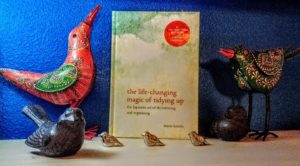 I bought Marie Kondo’s book, The Life-Changing Magic of Tidying Up, while traveling for Christmas a few years ago. We were staying at a rental house that was incredibly clean and sparsely decorated—I was ready to occupy that space permanently. Reading Kondo’s book made me eager to return home and tidy the hell out of everything; it seemed possible I could achieve this goal in the New Year. December almost always fools me like this.
I bought Marie Kondo’s book, The Life-Changing Magic of Tidying Up, while traveling for Christmas a few years ago. We were staying at a rental house that was incredibly clean and sparsely decorated—I was ready to occupy that space permanently. Reading Kondo’s book made me eager to return home and tidy the hell out of everything; it seemed possible I could achieve this goal in the New Year. December almost always fools me like this.
I did some of what Kondo suggested. There were old clothes I had held onto—Guess jeans from 1987—and books that had fulfilled their purpose. When I first started letting go of objects, I thought it was corny to thank these items for their service (one of Kondo’s tenets) before passing them on to thrift stores, but it put me in touch with what I actually needed in my life, which was (and is) a lot less. And, speaking of books that fulfilled their purpose, I thanked Kondo and Magic for their help, and gave my copy to Bookman’s for someone else to experience the joy of tidying.
Kondo now hosts a show on Netflix, Tidying Up, where she helps people organize their homes. She asks owners to imagine what items they want to take into their future, including items that “spark joy.” The show, and her catchphrase, has made her a target in both media and on the internet: there are far more jokes about her and her methods than support. On Twitter, I noticed people went from witty observations to “F-off, Marie” in almost the same tweet. I felt tense reading so much anger and hostility directed at someone who asks that we consider keeping what brings us joy. These people laughing, then raging, may have had a moment of uncomfortable realization—when was the last time someone asked us (or we asked ourselves) about our own joy?
When I went through my own process of divesting myself of stuff, I was confronted by the memories of my reasons for acquisition. While working in a series of difficult environments, I would leave the office daily at lunchtime. I never meant to go shopping, but I would go into a store and find some small item, such as a bird figurine, that would bring me comfort for a few moments. I would take it back to the office, look at it and remind myself that I deserved this piece of joy. Over time I realized that long term joy cannot be found in figurines (or $5 coffee beverages). This led to me changing careers, building new friendships and not relying on objects for moments of joy. There was a lot of frustration, self-doubt and sometimes anger as I made this transition, which led to feelings of being unsettled in my life.
The speed with which we receive information also contributes to an ongoing sense of unease. We are afraid of missing something. Culturally, it seems as though we’re replacing real understanding and honest dialogue with partially gleaned information from the internet and snark. We don’t have time to read every article, which makes us frustrated, but we want to connect with the larger community that is discussing something timely, like Kondo’s KonMari method. We also want others to know that we’re smart, so we can’t ask what something is about—besides, we might be chastised by friends and strangers alike for being out of touch. And so, our protective armor from modern life has become our new communications method: topical snarkiness.
This is exhausting. We have little in our arsenal to protect us from the onslaught of daily living except to work even harder to ignore or avoid the snark. But to do so also means missing some piece of news or some cultural touchstone. For example, I somehow survived two days on the internet recently not knowing the context for the photo of the president standing behind a fast food buffet with candelabras. It was a moment when I refused to find out what it was about and instead saw the photo for what it was: an unnerving distraction where we focus on the wrong things because life seems to move in a new construct of “online time.” Online time makes us feel both like we can never catch up and that our ideas cease to be relevant almost as soon as we’ve thought them.
If our ideas have only a short time until expiration, making them no longer relevant, what does this do to us? I’m learning that I do not need to understand or contribute to the zeitgeist of every moment. By the time this article is printed, I am sure most of this Kon-Madness will have passed and there will be some new thing to make us feel perpetually behind and frustrated and snarky. But I needed a few weeks’ time to process the show, read her book again (yes, I bought another copy at Bookmans, perhaps my own), consider everything I was reading online and put this all into the broader context of how I understand the world. This is new for me—this luxury of time I gave myself. I claimed joy in a new space—the joy of reflection—time to think and write rather than trying to exist and perform in online time. I want to figure out what is really going on here.
I’m still figuring it out, but what I’ve come up with is this: we do actually get to set some of the terms in which we want to live our lives. What if we acknowledge that others have moments of joy that are different from ours rather than being frustrated and snarky? Or realize that we have better things to do than play perpetual catch-up in online time? Perhaps then we could work toward giving ourselves back our lives in real time and finding some semblance of our own joy again.

